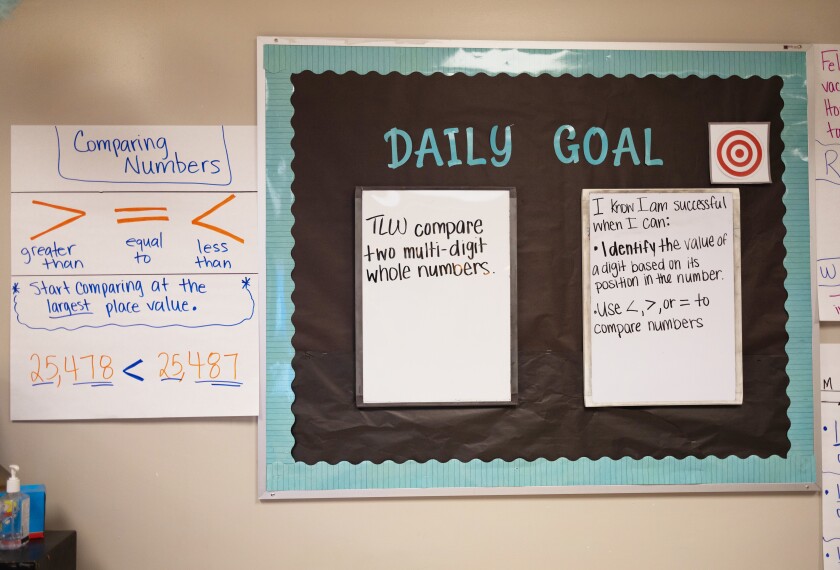Want to learn more? Sign up for a free five-week email mini-course full of research-backed strategies to help students make sense of math.
Math anxiety doesn’t just make students choke on tests. It changes their approach to learning the subject in ways that sets them up for ongoing failure.
A new study in the Journal of Experimental Psychology suggests math-anxious students choose less-effective ways to study, like rereading textbooks instead of working through real problems. This, in turn, can make them less prepared for exams and heighten the risk students will also “freeze” on the math test itself.
“The anxiety that happens in the moment [is] really robbing you of the ability to focus and do your best, and that’s one of the reasons why math anxiety was often related to poor performance. But we knew that wasn’t the whole story,” said Jalisha Jenifer, lead author of the study and postdoctoral research fellow at Barnard College of Columbia University. “Now we’re able to start pinpointing the way in which highly math-anxious people also ... walk in less prepared.”
While students who are initially low-performing are also at higher risk of developing math anxiety, the study focused on students in Advanced Placement calculus courses. Even among these students, whose placement put them above average performance in math, those with high math anxiety were less likely to study efficiently than students with low levels of anxiety about the subject.
For example, researchers found math-anxious students dedicated more time to passive activities like reading their textbooks or looking at already-solved problems—which prior research has found tends to make students think they understand more than they actually do about content. By contrast, they spent less time actually practicing math skills.
“Solving math problems can help you to understand where gaps may be in your knowledge; you may not notice those things if you’re just reviewing practice problems,” Jenifer said. “Without challenging yourself in those ways … you may never practice in the ways that you need for the exam.”
Pandemic may have heightened math anxiety risk
The findings suggest that focusing on explicit study and anti-anxiety strategies may be critical for educators working to catch up students who lost significant ground in math during the disruptions of the last two years. General anxiety has increased for students during the pandemic, and “it’s reasonable to expect increased levels of anxiety around math, especially if [students are] getting signals that you’re not where you should be, that you’re behind,” said co-author Sian Beilock, math anxiety researcher and president of Barnard.
The vast majority of Americans report at least some levels of discomfort with math, and about a third report moderate to severe anxiety about the subject. More than 25 years of research suggests math anxiety can begin in the early elementary grades, but increases through middle and high school, particularly for students in groups stereotypically considered lower performers in math, such as women.
“Math may be a microcosm for what could play out in other areas,” Beilock said in an interview. “So if you have anxiety about biology or some other subject you’re taking, I think what we’re showing here is, one of the reasons that anxiety tends to be correlated with poor performance is that anxiety pushes people to not engage in study material in a way that’s efficacious.”
In fact, a 2021 study in the journal Nature: Science of Learning found incoming college students with high math anxiety took fewer science, technology, engineering, and math classes, and underperformed in the ones they did take, compared to more-confident students with the same ability in math. Researchers led by Georgetown University psychologist Richard Daker concluded, “Math anxiety can account for associations between math ability and STEM outcomes, suggesting that past links between math ability and real-world outcomes may, in fact, be at least partially explainable by attitudes toward math.”
Simple changes can help math-anxious students
In a 2020 survey, 67 percent of teachers told the EdWeek Research Center that math anxiety was a challenge for their students. But Jenifer and Beilock said simple changes before and during testing can boost students’ confidence and performance.
As students prepare for a math test, Beilock said it’s important for teachers to explicitly describe what makes study methods effective or not.
“I don’t think people are always aware that their study strategies are ineffective and what might be pushing them in different ways,” Beilock said. “This research shows that there is a tendency for people who are anxious to stay away from more-difficult problems or more-effortful problems during practice—and just knowing that could push you in the opposite direction.”
Teachers can help math-anxious students learn to study more effectively by providing both partially worked and unworked practice problems for review, which Jenifer said can ease students into practice. Similarly, teachers can give students more confidence to tackle challenging problems by asking students to solve them as part of games or puzzles, rather than for grades or homework.
On the day of a test, research suggests teachers can also help students reframe their physical symptoms of anxiety—such as sweating palms or a racing heartbeat—as signs of excitement or readiness. This reframing has been shown to help students avoid “choking” on exams.
Over time, helping anxious students learn to prepare more effectively and calm their anxiety in the moment can improve their math performance and help them gain more confidence in math—and even make them more likely to choose math and science work on their own.






